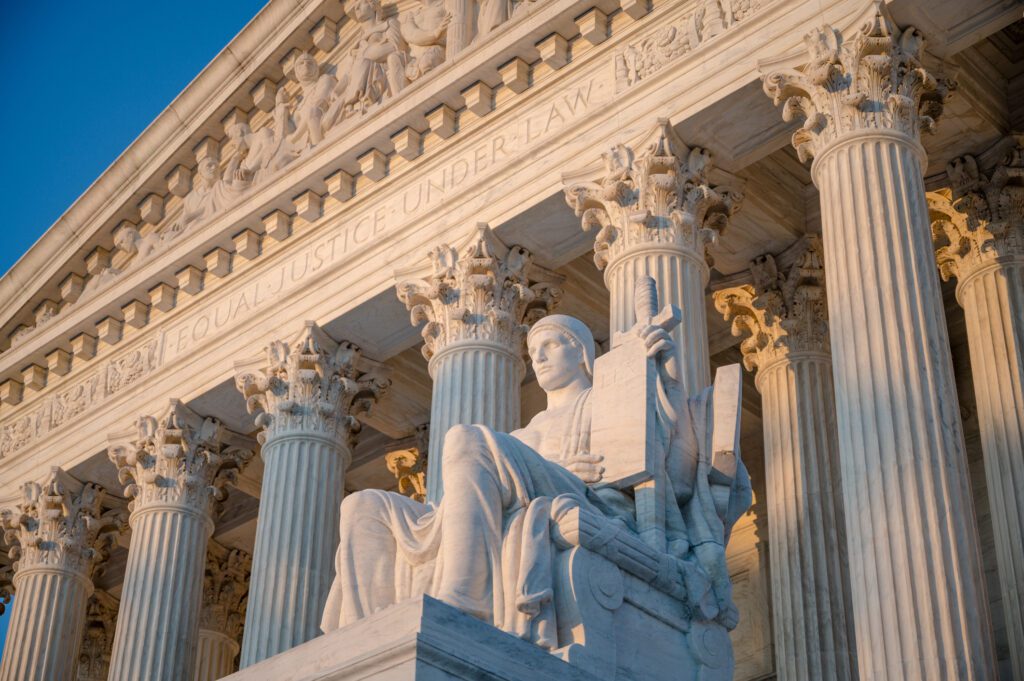How 2022 Campaigns Will Capitalize on the Pending Supreme Court Pick
Republicans and Democrats could both use a little help firing up their fans for the fall.

Welcome to a proud American political ritual: the confirmation of a new justice to the Supreme Court. We don’t know the nominee yet, but we can already predict the outlines of the contest to come. The Biden administration will propose a candidate, the Republican opposition will scream to the heavens, and as long as Sens. Manchin and Sinema stay on side, that candidate will take her seat sometime next fall.
Game over? Not quite.
This year, campaigns can also get in on the fun, regardless of their party or the office they’re running for. They can take advantage of a tried-and-true playbook to get the most out of the rare opportunity a pre-midterm court fight provides.
1. Bringing the team together
Republicans and Democrats could both use a little help firing up their fans for the fall. Republicans benefit from a useful enemy in the form of the Biden administration, of course, and many of their voters are already raring to take down the Libs in November.
But with Donald Trump praising the Capitol rioters and picking “winners” in primary fights, some of the more moderate parts of the conservative coalition may not be as enthusiastic as needed. Also, some Republican primary elections will surely err on the bitter side, leaving a lingering aftertaste from personal attacks and negative ads. What’s great to help Republicans forgive each others’ doctrinal and behavioral sins? A Democratic court nominee, with whose politics everyone in the party can disagree.
It’s the Democrats who could REALLY use the help, though. They’re fighting history (a party almost always loses House seats in the first midterm after winning the White House), a pandemic, an unpopular president and their own missteps. Fortunately for their candidates this fall, the Biden teams seems almost certain to pick a nominee guaranteed to excite the base.
Putting a qualified Black woman on the highest court in the land would be historic, and it would also give Democrats — and Black Democrats in particular — a tangible win. Which is something the party desperately needs in a presidential term that’s so far seen a humiliation in Afghanistan and the failure (at least for now) of a huge portion of the progressive agenda. Thanks, Breyer!
2. Sharpening the lines
Besides bringing the band back together, a Supreme Court battle can serve the useful function of differentiating the sides in an obvious way. Low-information voters often don’t understand the intricacies of the economy or foreign policy, but they can see whether a candidate supports or opposes a potential justice.
This dynamic is less likely to matter in the primaries, where it’s hard to come down too much harder for or against a potential justice than your like-minded opponents. But with the national news media sure to play up any confirmation drama, most potential general election voters should have at least heard the nominee’s name and have some idea to which political tribe she belongs. From there, it’s up to the campaigns and their allies to try to get those voters to care enough to do something about it.
3. For the [fundraising] win
Of course, a Supreme Court fight can help candidates at all levels bring in that sweet political cash. Not running for U.S. Senate? No conceivable role in voting Biden’s nominee up or down? No problem! You can still run ads and send emails touting your stance for or against the justice-in-waiting.
The reason? The same factors that rally the troops will also help campaigns fundraise for primaries and the general. Activists will be looking for outlets for their enthusiasm and/or frustration, and your campaign wants to be the one for which they open their wallets.
For candidates trying to raise money outside of their district or state, taking a prominent role in the public discussion on Twitter, talk radio or cable news can help you reach potential donors who would otherwise have no interest in putting you in a position to bring home the bacon for your future constituents.
Likewise, coverage of the court battle offers a chance to introduce yourself to online activist communities like Daily Kos on the left, or the people who follow popular podcasters on the right. Functionally, you’re only limited by your time, creativity and lack of shame — just please don’t lie about what you’ll actually be able to do on behalf of all those new supporters.
Once the nominee’s voted in or out, campaigns will have to live with the passions stirred up and the raw nerves danced upon. The rest of us will have to live with the new justice’s decisions for the rest of her life. This moment may be a game for some in the political community, but it’s deadly serious for anyone planning to reside in the United States in the decades to come.
Colin Delany is founder and editor of the award-winning website Epolitics.com, author of “How to Use the Internet to Change the World – and Win Elections,” a twenty-five-year veteran of online politics and a perpetual skeptic. See something interesting? Send him a pitch at cpd@epolitics.com.

